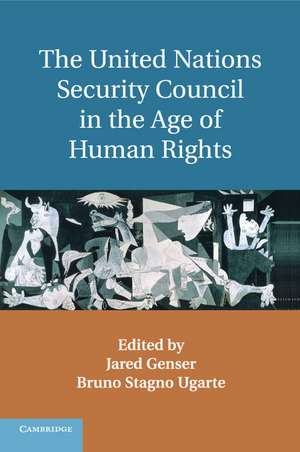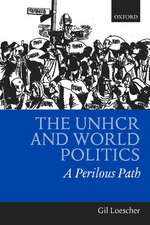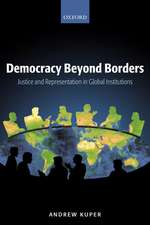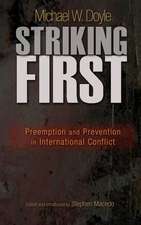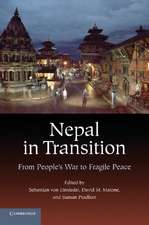The United Nations Security Council in the Age of Human Rights
Editat de Jared Genser, Bruno Stagno Ugarteen Limba Engleză Paperback – 31 aug 2016
| Toate formatele și edițiile | Preț | Express |
|---|---|---|
| Paperback (1) | 361.75 lei 6-8 săpt. | |
| Cambridge University Press – 31 aug 2016 | 361.75 lei 6-8 săpt. | |
| Hardback (1) | 899.99 lei 6-8 săpt. | |
| Cambridge University Press – 4 iun 2014 | 899.99 lei 6-8 săpt. |
Preț: 361.75 lei
Nou
Puncte Express: 543
Preț estimativ în valută:
69.22€ • 74.02$ • 57.71£
69.22€ • 74.02$ • 57.71£
Carte tipărită la comandă
Livrare economică 17 aprilie-01 mai
Preluare comenzi: 021 569.72.76
Specificații
ISBN-13: 9781316621158
ISBN-10: 1316621154
Pagini: 544
Ilustrații: 1 b/w illus. 2 maps
Dimensiuni: 153 x 230 x 30 mm
Greutate: 0.72 kg
Editura: Cambridge University Press
Colecția Cambridge University Press
Locul publicării:New York, United States
ISBN-10: 1316621154
Pagini: 544
Ilustrații: 1 b/w illus. 2 maps
Dimensiuni: 153 x 230 x 30 mm
Greutate: 0.72 kg
Editura: Cambridge University Press
Colecția Cambridge University Press
Locul publicării:New York, United States
Cuprins
Part I. The Security Council and Human Rights: 1. Evolution of the security council's engagement on human rights Bruno Stagno Ugarte and Jared Genser; Part II. Thematic Work of the Security Council: 2. Civilians and armed conflict Rosa Brooks; 3. Women, peace, and security Janet Benshoof; 4. Children and armed conflict Shamala Kandiah Thompson; Part III. Securing, Maintaining, and Building Peace: 5. UN peacekeeping and human rights Mari Katayanagi; 6. Coordination with other UN organs Bertrand G. Ramcharan; Part IV. Law and Justice: 7. Accountability for international crimes – special tribunals and referrals to the international criminal court William Schabas; 8. Enhancing rule of law Axel Marschik; Part V. Case Studies: 9. Rwanda Roméo A. Dallaire and Krystal Carrier; 10. Bosnia-Herzegovina Geoffrey Nice and Nena Tromp; 11. Timor-Leste José Ramos-Horta and Benedict Rogers; 12. Sudan (Darfur) Bruno Stagno Ugarte; 13. Democratic Republic of Congo Anthony W. Gambino; 14. Kosovo Søren Jessen-Petersen; 15. Libya Philippe Kirsch and Mohamed Helal; 16. Syria Richard Gowan and Paulo Sérgio Pinheiro; Part V. Conclusion.
Recenzii
'For decades the UN Security Council skirted human rights, addressing them sporadically, reluctantly, and typically without reference to binding standards. That began to change with the end of the Cold War, as easing political tensions allowed the Council gradually to act on the fact that upholding the norms against atrocities is intimately connected to its classic mandate of defending international peace and security. Yet even since then, that evolution has been contested, particularly when the Council's permanent five members fear the topic might come back to haunt them or their close allies. This exceptional volume of essays provides a comprehensive assessment of the Council's conflicting views on human rights with more nuance, sophistication, and historical memory than anything else around. It helps us to understand how the shifting battles over human rights are being waged in the Council and provides guidance as to how the Council can more effectively defend our rights in the future.' Kenneth Roth, Executive Director, Human Rights Watch
'Genser and Stagno Ugarte's authoritative new volume serves as an indispensable guide to understanding the complex UN Security Council and human rights nexus. The editors have assembled a stellar cast of renowned practitioners and academics to provide their candid and personal perspectives. The book, underpinned by meticulous research, offers a unique and penetrating critique of the Council's progress and failures in preventing and responding to human rights abuses. It also serves as a vital clarion call for a rejuvenated Security Council that places the consideration of human rights at the center of its work.' Sam Daws, Director, Project on UN and Governance and Reform, Centre for International Studies, Oxford University
'During the last twenty years, the UN Security Council has embraced the protection of individual rights as a matter of international peace and security. That said, progress has been uneven and there have been both great strides forward and terrible setbacks. This timely and important book provides the first comprehensive assessment of how the Security Council works to address major human-rights challenges around the world and recommends ways it can do so more effectively.' Luis Moreno Ocampo, First Prosecutor, International Criminal Court (2003–2012)
'Genser and Stagno Ugarte's authoritative new volume serves as an indispensable guide to understanding the complex UN Security Council and human rights nexus. The editors have assembled a stellar cast of renowned practitioners and academics to provide their candid and personal perspectives. The book, underpinned by meticulous research, offers a unique and penetrating critique of the Council's progress and failures in preventing and responding to human rights abuses. It also serves as a vital clarion call for a rejuvenated Security Council that places the consideration of human rights at the center of its work.' Sam Daws, Director, Project on UN and Governance and Reform, Centre for International Studies, Oxford University
'During the last twenty years, the UN Security Council has embraced the protection of individual rights as a matter of international peace and security. That said, progress has been uneven and there have been both great strides forward and terrible setbacks. This timely and important book provides the first comprehensive assessment of how the Security Council works to address major human-rights challenges around the world and recommends ways it can do so more effectively.' Luis Moreno Ocampo, First Prosecutor, International Criminal Court (2003–2012)
Descriere
The first comprehensive look at the human rights dimensions of the work of the only UN body capable of compelling action by its member states.
